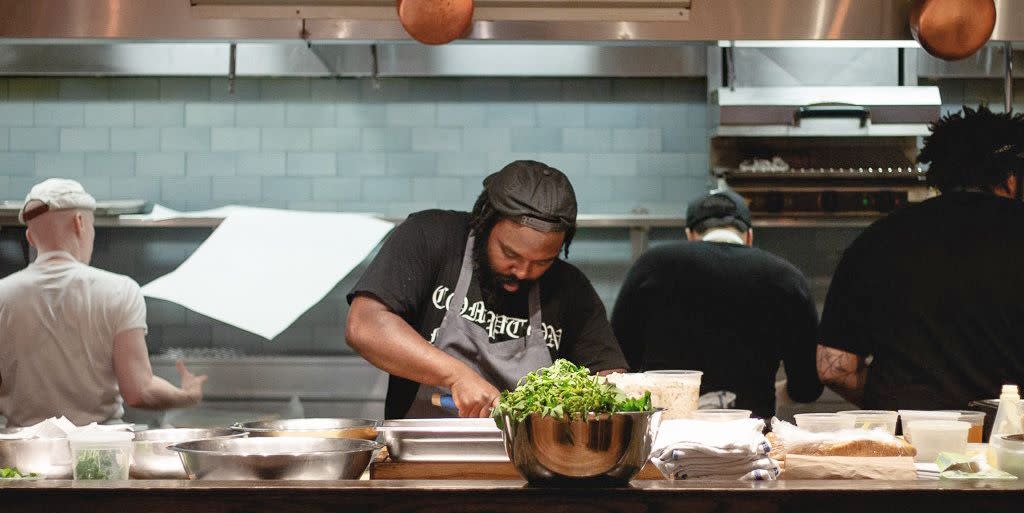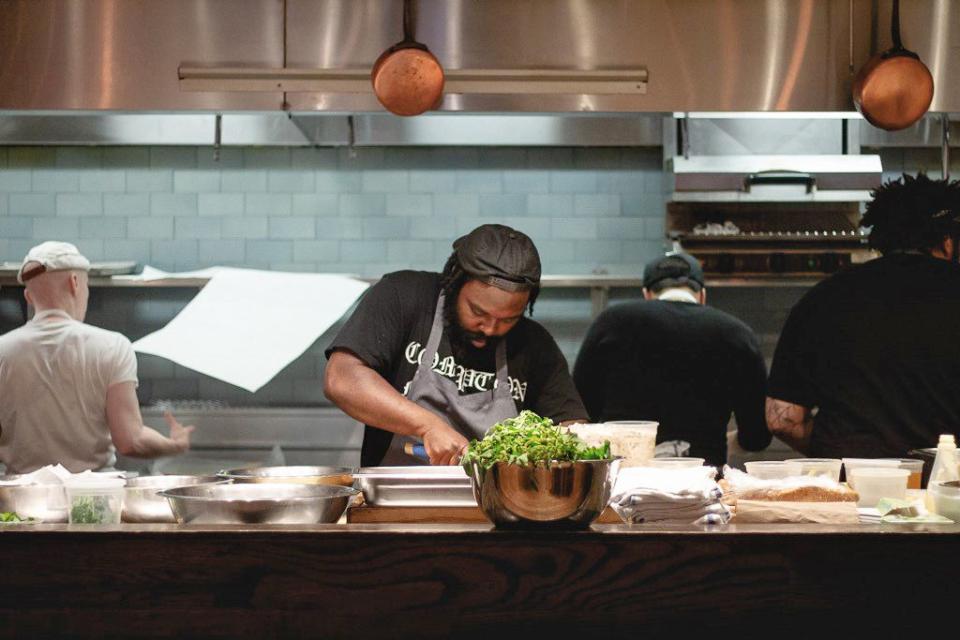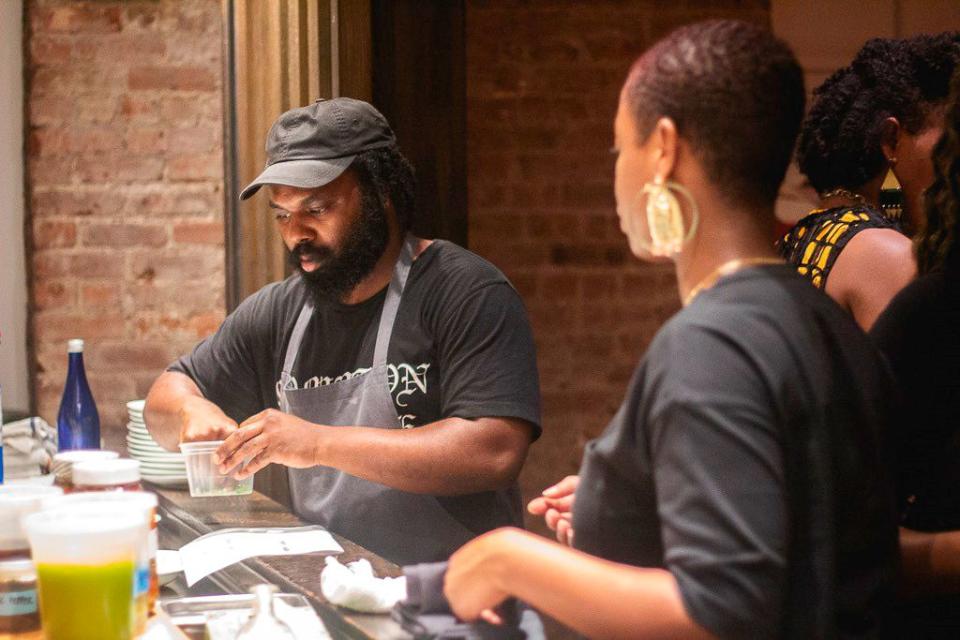The Restaurant Bail-Out Won't Save My Pop-Up. The Government Won't Save Black America.

Beef rap could lead to getting teeth capped
Or even a wreath for mom dukes on some grief crap
I suggest you change your diet
It can lead to high blood pressure if you fry it
Or even a stroke, heart attack, heart disease
It ain't no starting back once arteries start to squeeze
—excerpted from “Beef Rap” off MF DOOM’s 2004 album Mm.. Food
I have been known for telling the truth even if it hurts, even if it cries you to sleep. This winter COVID-19 and the restaurant industry told me a truth that sent me to bed rocking myself, searching for answers.
I began my journey with Honeysuckle, a pop-up that explored the narrative of Black existence, in pursuit of creating a platform for myself to challenge what fine dining was and who was allowed to participate in it. Honeysuckle dinners primarily happened out of a penthouse on Wall Street, high above the site of one of America’s more prominent slave auction blocks. (I partnered with a platform called Resident that hosted dinners in luxury residential units.) When you walked into a Honeysuckle dinner you entered into a portal of Blackness that made the joys and pains of existing kith and kin. Upon sitting, you stirred into a glass a pulverized mixture of freeze dried fruit, sugar, and acid mimicking “Kool Aid.” The drink of my childhood. A nod to joy around my dinner table and a debasing of the stigma associated with Black folks. I worked with other artists to adorn the walls, carefully chose the music, and used my own poetry through the meal to welcome you into a living room of funkadelic blues chords strumming into your soul. Most guests left thankful and introspective. Some left unsatisfied and felt that the meal was unworthy of the $150 minimum price tag. Either reaction was the reaction that I was looking for.
Just two months ago I was featured in The New York Times. Everything was looking up. I had speaking engagements. Participated in panels. I was writing. Applying ideas of affirmation through a Black lens for a meal that paralleled the experience of a Michelin star-caliber restaurant. Honeysuckle was real. It was peaking as an event and as a philosophy. I had been adding to the conversation of power shifting.

I was rubbing elbows with “important people” on the outside. Inside I was rubbing sticks together for fire. I was behind on my rent and living contract to contract. When the pandemic hit, I lost all income that was projected for the next six months with little left to stand on. I entered March with about two thousand dollars in my bank account wondering what my future was to be.
The important conversations with all of the important people don’t seem to matter much anymore.
I’ve packed my bags and left New York City for Philadelphia, where I live at my mother's house in the spare room. She’s an “essential” health care worker who is exposed to the dangers of the coronavirus every day. There isn’t much in my room but a mattress, a leaning bookshelf, and a eucalyptus plant that I found in a public flower pot. I stole it. It's blue-grey and brings me joy when the days are down.
I read the news or I don’t. I don’t care much for the pendulum of emotion that it controls. The voices of the witnesses of power sound like SportsCenter, except the game they report on is our actual lives and no one's winning.
I’m on the ground. I’m back in the hood. I hear what’s underneath the conversations that most Americans are pretending to learn again for the first time. Black people in America are poor and vulnerable. When America gets a cold, Black America gets pneumonia. I lost my uncle to COVID-19 this spring. He was 77 years old, living in a hospital at the time due to complications from diabetes. He was vulnerable. We don’t know how to prepare for the funeral. There's always been a pandemic here on the ground.
How do I make a dish about that? How do I tell our government that the one trillion dollar bailout that they have so graciously relieved us with doesn’t trickle down? Honeysuckle gave life to unheard truths, to groups of twenty or more curious folks at dinner at a time. But Honeysuckle was not a restaurant, and so it doesn’t qualify as an establishment worthy of voice in this economy. It was not a business, big or small. I don't qualify for any SBA loans. Honeysuckle existed like a Black American. Underfunded, under the radar, yet creating culture. Pop-ups don’t get bailed out.
I haven’t done my taxes in three years. I don’t qualify for a stimulus check. But neither does my homie who I had a conversation with last week. He lost his kitchen job and won’t qualify for the stimulus disbursement because he owes money to the government for child support payments. He’s one of my best friends; he’s got baby mama drama but takes care of his children. He doesn’t know what to do and is considering going back to hustling. As for me, I am a bike courier now. I get a different kind of news.

Since the pandemic began, I’ve been in conversation with several chefs across America whose careers were taking off prior, all of whom were working independently as pop-ups, caterers, or both. They face the same multitude of issues concerning food costs, labor, and other overhead expenses, often without the safety of insurance policies or protection through government agencies that restaurants have. This reality is even more stark in the Black community as historically many operations begin and continue to function out of homes or other trusted spaces. Working from home has always meant something entirely different down here on the ground. It begins with racism, and the lack of trust and acceptance of Blackness in the idioms of American culture. Being maligned creates a system of subverting societal structure to mitigate survival. Doing hair or barbering in the kitchen, selling water or ice from the porch, offering pies and cakes from the doorstep. Working from home means community, it means kinship and safety. This isn’t new—we’ve been bailing ourselves out in America since 1619.
Black chefs are feeling the crippling weight of this fragile industry as we work towards our own solutions. Some of us are going back to those old roots of survival by doing what we have always done: cook. In the hood there was always someone selling dinner platters. For roughly twelve bucks you could buy an entire meal and a few sides piled into a styrofoam container. Delicious and enough food for a few people. More important, there was trust. The hand under the styrofoam container cared about you. They knew your family and friends, they knew what you usually ordered. Cash and a smile is all you needed. Maybe a cup of lemonade to wash it down.
Chef BJ Dennis of Charleston, South Carolina has been selling Gullah Geechee cuisine at a cost lower than he used to in his community. Chef Enrika Williams of Jackson, Mississippi, who has gone back to selling plates and pies based on her mother’s recipes, said to me in a recent text, “It’s easy coin and I get to see old regulars and new ones too.” Chef Wanda Blake of Oakland, California has been selling gumbo and chow chow for years, and she’s seen “great increase” in her sales since the pandemic. Black businesses in the hood continue to be supported by the very community that always has; its own.
I hear all of the big chefs and writers weighing in and advocating for justice for this industry. I’ve seen the #letitdie campaign, a hashtag promoting a rebirth of restaurants in equality and fairness for all who participate in this business. I’ve seen the graphs, charts, and statistics. I understand what’s happening. I am proud to know many of the important folks who are doing the work to have these important conversations. But down here on the ground there are issues that can not be so easily rectified. I don’t understand how these conversations are going to help Black folks on the other side. Will our communities be healthier, safer, cleaner, better educated, better financed, policed less? Will they see us down here? I gotta be honest, I’m not optimistic. The politics have never really worked in our favor.
A post shared by Omar Tate (@coltrane215) on Apr 28, 2020 at 7:35pm PDT
Since returning home I have been doing the Honeysuckle pop-up as take-out to help make ends meet. It's part therapy, part practice, and part joy. The prices are significantly lower than the $150-to-$300 price tag I was selling my dinner events for just over a month ago. The food is not simple, it's complex but unfancy. It's deliciousness in a compostable box to go. I prepare it at home mostly and distribute it from South Philly Barbacoa in the Italian Market neighborhood. People enjoy it and have said that it's a once-a-week treat, a reason to put a mask on and get out of the house.
Every day to feed my family, I walk past the dope boy in front of the corner store to go inside and choose from the lesser of several food evils. I shop there because the closest supermarket in this neighborhood closed for good after an alleged robbery. There have been rumors that it was actually an insurance scam by the owners of the building. It was the only place that had fresh meat and produce of moderately decent quality. We’re now forced to shop at the smaller stores and make tough decisions about our diets and health. When I see the young man I say good morning and sometimes he holds the door open for me. I’ve been there in those shoes before. When I leave the store I tell him to be safe and to watch out for “The Law.”
I get a different kind of news.
Omar Tate is the chef and artist behind the dining pop-up Honeysuckle.
You Might Also Like

